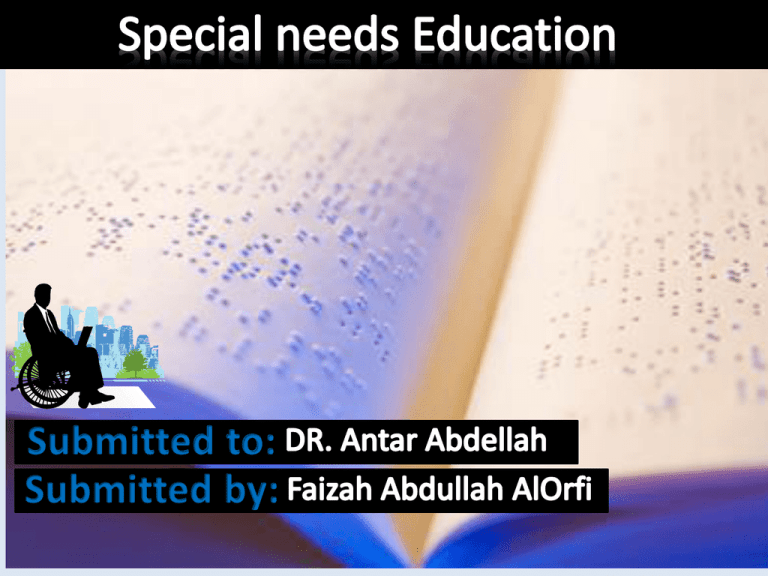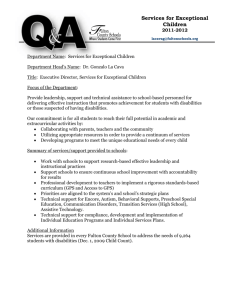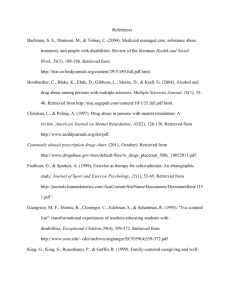******* 1 - Dr.Antar Abdellah Home Page
advertisement

special education is specially designed instruction that meets the unusual needs of an exceptional student. An exceptional student is an individual with a disability or with disabilities. A disabled person defined as someone who has a physical or mental impairment that has a substantial and long-term adverse effect on his or her ability to carry out normal day-to-day activities. blindness physical disabilities speech defects Deafness and hard of hearing giftedness Mental retardation Equality among people is a noble principle which is sought by human beings in all corners of the globe. In Islam, true competition is not based on property, race, social status, wealth, color, sex, or completeness of physical,sensory , or mental abilities, but, rather, it is based on the piety to God in word and action.. Islam has ensured for persons with disabilities a conductive environment which enables them to achieve their highest aspirations. In Islam, persons with disabilities are, firstly, human beings, and then they are secondly, disabled persons who have rights to enjoy, and have duties to perform as any member of the community. The Position of Islam Towards Persons with Disabilities Nothing can explain the inherent rights of persons with disabilities in Islam more than when Allah, the Almighty, blamed His Prophet, Muhammad (peace be upon him) regarding Abdullah bin Um Maktoum, where Allah, the Almighty, says: "(The Prophet) frowned and turned away (1), Because there came to him a blind man (interrupting) (2), But what could tell thee but that perchance he might grow (in spiritual understanding)?(3)Or, that he might receive admonition, and the teaching might benefit him? (4)." (Holy Qur'an, chapter 80). Special education is the shared responsibility of the principal, regular classroom and special education teachers, support staff, the parents, and the student. Ongoing communication among these people is particularly important for the exceptional pupil. As exceptional pupils get older, it is expected that they will become increasingly accountable for their own learning. Their success in achieving a higher level of independence can be greatly helped by close cooperation among all partners. This refers to schools, centers of learning and educational systems that are open to ALL children. It is the act of ensuring that all children despite their differences, receive the opportunity of being part of the same classroom as other children of their age. I N C L U S I O N - Integration - Networking - Collaboration - Living, Learning, Loving - Utilizing all available resources - Support an social services - Implementation of appropriate programs - Organization of appropriate services - Non-stop services to all children with special needs : You can recognize children’s strengths and weaknesses and plan your lessons accordingly. You know how children’s learning can be affected by disabilities and you use teaching strategies for overcoming these difficulties; You have confidence in your own abilities as a teacher to plan lessons for individuals and adapt the curriculum to suit the needs of all children; You get help and support from colleagues, parents and other professionals, such as community and health workers. You believe that all children have the right to education and that all can learn. Why Special needs education is important because: It motivates learners with disabilities. It enhances their self-esteem. It makes them less dependent on others. In an inclusive environment, learners with disabilities are given chance to interact with other learners, thereby enhancing their interaction skills and patterns. Special Education Strategies Provide an oral instruction for students with reading disabilities. Provide learning disabled students with frequent progress checks. Let them know how well they are progressing toward an individual or class goal. Give immediate feedback to learning disabled students. They need to promptly see the relationship between what was taught and what was learned. Whenever possible, provide them with concrete objects and events—items they can touch, hear, smell, etc Strategies appropriate for teachers of learning disabled students Learning disabled students need and should get lots of specific praise. When necessary, plan to repeat instructions or offer information in both written and verbal formats. Encourage cooperative learning activities when possible. A talented child is one possessing outstanding abilities who is capable of above average performance as indicated by demonstrated achievement and/or potential ability. Talented children will display many of the following characteristics: 1-Learning 1- Solve problems on a superior level using different thinking processes. 2- Show a sustained interest in one or more fields. 3- Have power of abstraction and conceptualization. 4-Be verbally proficient and interested in reading. 5-Enjoy complicated games and situations. 6-See relationships and draw sound generalizations. 7-Apply learning to new and different situations. 8-Initiate their own activities. 9-Learn easily and rapidly. 10-Create new ideas and processes. Talented children will display many of the following characteristics: 2-Personality A keen sense of humor. personal sensitivity. Independence. compassion for others. Set high goals and ideals. perfectionism. Self disciplined. Intensity. Sensitive to values and justice. moral sensitivity. Intense concentration span. unusual curiosity Analyze themselves and often be self critical persevering when interested Response to an assignment Response to a question strength Possible problem Advanced verbal skills Talks too much, talks above the heads of age peers Critical thinking Critical of others, perfectionist, sets unreasonable standards for self and others Prefers complexity Resists simple solutions, constructs complicated rules, bossy Long attention span Tunnel vision, resists interruption, stubborn. Acquires/retains information easily impatient with others, dislikes basic or repetitive routines exercises. creating a room that invites inquiry (pictures, books, areas for music, art). making a wide range of materials available. arrange for activity centers for self initiated projects. flexible seating arrangements. offer attractive, lesson related activity options for students who finish work early. vary the atmosphere of the room through music as well as opportunities for creative movement, mime, singing. http://www.edu.gov.on.ca/eng/policyfunding/ocup/documents/speced2002.pdf References 1- Understanding and Responding to Children’s Needs in Inclusive Classrooms (2001). Retrieved from http://unesdoc.unesco.org/images/0012/001243/124394e.pdf. 2- Disabled World News (2009-12-23) - Definitions of Disability a word used in daily conversations that holds different meanings for different people: http://www.disabledworld.com/definitions/disability-definitions.php#ixzz2EJMk7HZJ 3-Education In The New Millennium(2012).Retrieved from: http://conferences.cluteonline.com/ index.php/IAC/2012RM/paper/view/1344/1369 4-Monthly Spotlight: Special Education. Retrieved from: http://www.peopleseducation. /com/community/newsletter/June2012 5-Special Education Companion(2012). Retrieved from: http://www.edu.gov.on.ca/eng/ policyfunding/ocup/documents/speced2002.pdf 6-Special Needs Education(African Virtual university). Retrieved from: http://oer.avu.org/bitstream/handle/123456789/157/SPECIAL-NEEDS.pdf?sequence=1 7-Teaching Young Gifted Children in the Regular Classroom(Joan Franklin 2000). Retrieved from: http://www.cec.sped.org/AM/Template.cfm?Section=Home&TEMPLATE=/CM/ContentDisp lay.cfm&CONTENTID=2517 References 8- Almusa ,A (2004). Blindness in Islam. University of Northern Colorado. Retrieved from: faculty.ksu.edu.sa/.../Blindness%20in%20Islam.doc. 9-Definition of Gifted Education. Retrieved from : http://ehlt.flinders.edu.au/education/ DLiT/2008/GiftedEdWeb/mainpage.htm 10-IN-SERVICE TEACHER EDUCATION ON INCLUSIVE EDUCATION(2008). Retrieved from: http://depssa.ignou.ac.in/wiki/images/5/5e/CRC-InclusiveEducation.pdf 11-Alquraini, T (2011). Special Education in Saudi Arabia: Challenges, Perspectives, Future Possibilities. INTERNATIONAL JOURNAL OF SPECIAL EDUCATION. Vol 26 No 2 .






